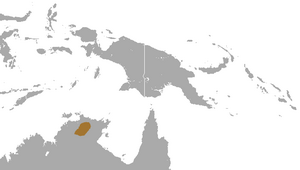Woodward's wallaroo facts for kids
Quick facts for kids Woodward's wallaroo |
|
|---|---|
 |
|
| Conservation status | |
| Scientific classification | |
| Kingdom: | |
| Phylum: | |
| Class: | |
| Infraclass: | |
| Order: | |
| Family: | |
| Genus: | |
| Binomial name | |
| Macropus bernardus Rothschild, 1904
|
|
The Woodward's wallaroo (Macropus bernardus) is also known as the black wallaroo or Bernard's wallaroo. It is the smallest type of wallaroo. This animal is quite shy and mostly active at night. It does not live in large groups.
Contents
About the Woodward's Wallaroo
The Woodward's wallaroo is a type of kangaroo that lives in rocky areas. The word "wallaroo" actually means "rock kangaroo." These animals are good at hiding and finding shelter among the cliffs where they live.
What Does It Look Like?
Male Woodward's wallaroos are usually black or a very dark brown color. The females, however, are a grey color. This difference in color makes it easy to tell them apart.
Where Does It Live?
This special wallaroo is only found in a small, mountainous part of Arnhem Land in the Northern Territory of Australia. This area is located between the South Alligator River and Nabarlek. Because it lives in such a small area, it is considered a unique animal.
Its Lifestyle
The Woodward's wallaroo is a nocturnal animal, which means it is most active during the night. During the day, it rests and hides. It is also a grazer, meaning it mainly eats grass and other plants. These wallaroos are not very social and prefer to live alone or in very small groups.
Why Is It Special?
The Woodward's wallaroo is classified as "near threatened." This means that while it is not in immediate danger of disappearing, its numbers could become low if its habitat is disturbed. Its small living area makes it more vulnerable than animals that live in larger regions. Protecting its rocky home is important for its survival.
See also
 In Spanish: Walaró negro para niños
In Spanish: Walaró negro para niños


